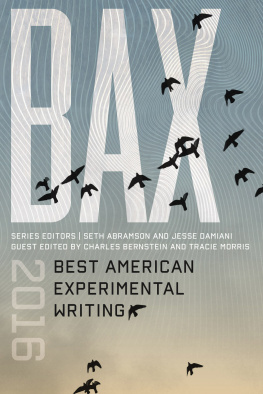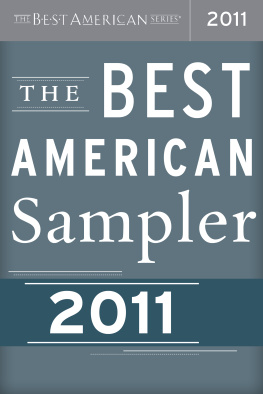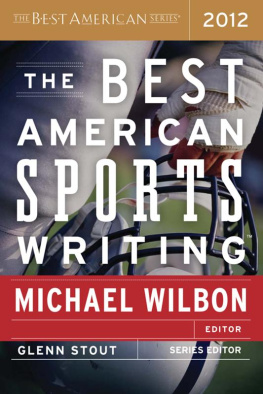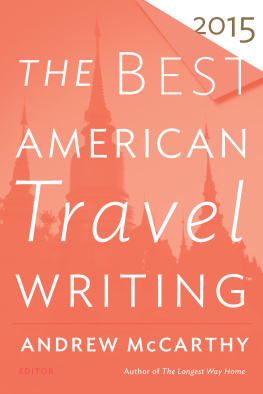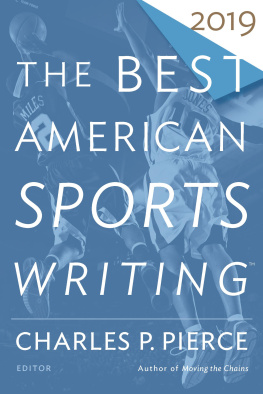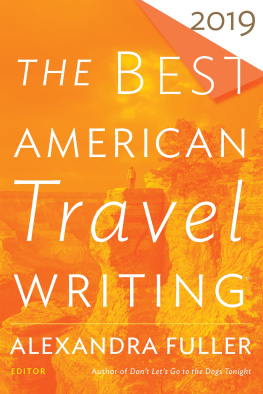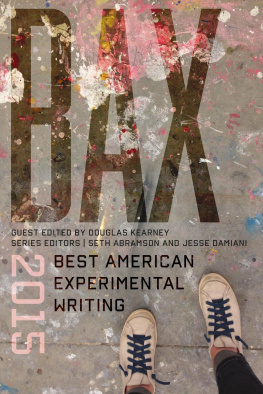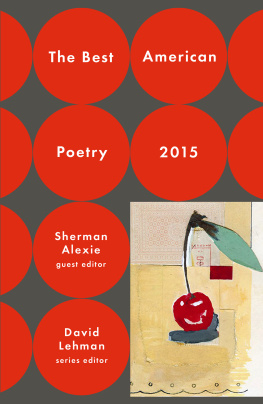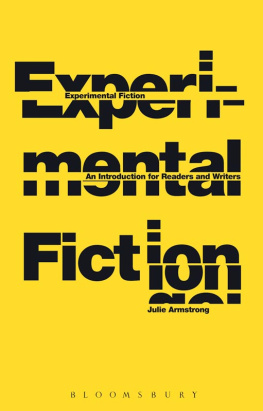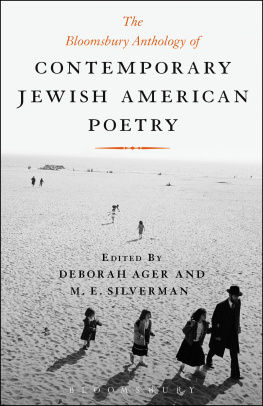
BAX 2016
BAX: BEST AMERICAN EXPERIMENTAL WRITING
Series Editors Seth Abramson and Jesse Damiani
Managing Editor Michael Martin Shea
BAX 2016
Guest Editors Charles Bernstein and Tracie Morris
BAX 2015
Guest Editor Douglas Kearney
BAX 2014
Guest Editor Cole Swensen
BAX 2016
BEST AMERICAN EXPERIMENTAL WRITING
Guest Editors | Charles Bernstein and Tracie Morris
Series Editors | Seth Abramson and Jesse Damiani
Managing Editor | Michael Martin Shea
Wesleyan University Press
Middletown, Connecticut
Wesleyan University Press
Middletown CT 06459
www.wesleyan.edu/wespress
2016 Wesleyan University Press
All rights reserved
Manufactured in the United States of America
Designed by Mindy Basinger Hill
Typeset in Minion Pro
Hardcover ISBN: 978-0-8195-7673-6
Paperback ISBN: 978-0-8195-7674-3
Ebook ISBN: 978-0-8195-7675-0
5 4 3 2 1
Cover illustration: Background texture: nomadsoul1 / 123rf.com Stock Photo. Birds: morguefile.com
Contents
CHARLES BERNSTEIN AND TRACIE MORRIS |
SETH ABRAMSON AND JESSE DAMIANI |
SAMUEL ACE |
DIANA ADAMS |
STEVEN ALVAREZ |
MARK AMERIKA |
JENNIFER BARTLETT |
LESLEY BATTLER |
CHRISTIAN BK |
ANNE BOYER |
M.K. BRAKE |
BRANDON BROWN |
LONELY CHRISTOPHER |
MAXWELL OWEN CLARK |
MARK Z. DANIELEWSKI |
KEVIN DAVIES |
NATHANIEL DAVIS |
SAMUEL R. DELANY |
ERIK DIDRIKSEN |
CRAIG DWORKIN |
TIM FIELDER |
RICHARD FOREMAN |
TONYA M. FOSTER |
PETER GIZZI |
JODY GLADDING |
MIRA GONZALEZ |
JEAN GRAE |
E. TRACY GRINNELL |
GABRIEL GUDDING |
JOSEPH HARRINGTON |
JEN HOFER |
ERICA HUNT |
DARIUS JAMES AND TN KHNH CAO |
PATRICIA SPEARS JONES |
ERICA KAUFMAN |
JAKE KENNEDY |
MYUNG MI KIM |
MICHAEL KIRBY |
SONNET LABB |
MONROE LAWRENCE |
GEORGE E. LEWIS |
TAN LIN |
CORBIN LOUIS |
JANICE A. LOWE |
CHRIS MANN |
D. S. MARRIOTT |
JIMMY MCINNES |
KEVIN MCPHERSON ECKHOFF |
K. SILEM MOHAMMAD |
WANGECHI MUTU |
A. L. NIELSEN |
JENN MARIE NUNES AND MEL COYLE |
BARACK OBAMA |
SHELAGH PATTERSON |
JULIE EZELLE PATTON |
TRACE PETERSON |
SINA QUEYRAS |
AOIFE ROBERTS |
LISA ROBERTSON |
METTA SMA |
JAMES SANDERS |
JENNIFER SCAPPETTONE |
RICHARD SCHECHNER |
CAROLEE SCHNEEMANN |
SARAH SCHULMAN, JACK WATERS, AND STEPHEN WINTER |
DREAD SCOTT |
ROD SMITH |
JULIANA SPAHR |
FAKHAIR SPENCE |
MOEZ SURANI |
KO KO THETT |
EDWIN TORRES |
RICHARD TUTTLE |
IMANI UZURI |
ELIZABETH WILLIS |
MATVEI YANKELEVICH |
YOUNG PARIS |
Digital-only contributions to BAX 2016 can be found at: bax.site.wesleyan.edu.
DAVID GIBBS
This Is Our Business
RACHEL ELIZA GRIFFITHS
The Undressed Syllable
AMY MARENGO
wishbone drying; this cloudbank; close lightning
TOM MIROVSKI
How to Make a Nature Poem
SAWNIE MORRIS
Elegy to a Baby Albatross at Midway Atoll
AZIZAA
Black Magic Woman
ERYKAH BADU
DialAfreaq
KENDRICK LAMAR
The Blacker the Berry
CHARLES BERNSTEIN AND TRACIE MORRIS
Guest Editors Introduction
America is an experiment.
Thomas Jefferson thought that there needed to be a rebellion against the existing government every twenty years, even if, as he recognized, some of those rebellions were fueled more by ignorance than a desire for liberty. During this election year, we may well ask if all rebellions are equally valued, but every generation certainly needs a revolution of the word. The initial rebellions of L=A=N=G=U=A=G=E, the Black Arts Movement, and Hip Hop are already two generations behind us. Since that time, American poetrys mainstreams have absorbed some of the stylistic manners of these movements but not the burning desire for unpredictability, development, and change. What the mainstreams have absorbed is some of the technique but not the motivation. A style that was cutting edge twenty years ago isnt going to cut it now. A style that is cutting edge right now wont be so for long.
Art isnt easy. Its not just that we need a revolution in style but also a revolution in audience, distribution, circulation, performance, perception, and, indeed, motivation. These revolutions are never a question of being marked as ahead of the timesthat is the problem with the label avant-garde, with its flamboyant promise of being out front. Rather, the issue is staying in and with the times and not letting the times drown us. In editing this collection, we looked for works that refuse to be sunk by a faddist, temporal undertow.
All the standard terms for inventiveness in the arts are vexing, even when well intentioned. Experiment can suggest that the focus is on the work-product or test results, despite the fact that writing that is open to new possibilities is more likely to be aesthetically accomplished than work that closes off such possibilities. Avant-garde often evokes a hermetically sealed tradition hobbled by its own triumphalism. We need avant-garde literary history to revolutionize overly narrow lineages and to acknowledge that the revolution of the word was fomented by writers who operated both inside and outside the cultural, ethnic, religious, or racial mainstreams. Which is to say, along with a host of literary scholars, artists, and anthologists from the past few decades, avant-garde history has not always acknowledged its innovators. At the same time, many of those hostile to what they call avant-garde poetry gerrymander the term to suit their foregone biases against it.
Rather than saying avant-garde, we say en garde: wake up, poetry is about to begin!
In 2015, as for a hundred years before, innovative poetry continued to be controversial. Of course, there is much to be critical of in poetrys multitude of iterations, and most practitioners of anything remotely resembling the experimental are quick to make a wide range of criticism, since this is a group of unlike-minded individuals. But all the hoopla suggests that whats innovative is, paradoxically, at the vital center of contemporary poetics and that its symbolic constructions are therefore subject to the most virulent scrutiny and worthwhile critique.
Next page
